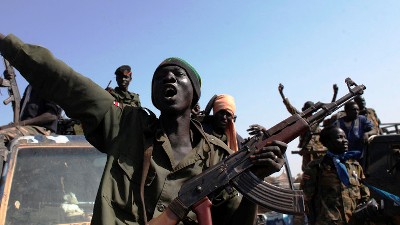S. Sudan cabinet approves extra budget for army
January 31, 2014 (JUBA) – South Sudan cabinet on Friday approved 83 million South Sudanese Pounds (SSP) (about $2.6 million) mainly to finance its military force.

He further disclosed that 50 million SSP had been “re-allocated” to the South Sudanese army (SPLA) from other ministries’ spending and development funds.
Since mid-December last year, the SPLA, alongside Uganda troops has been fighting against dissident soldiers and armed civilians who defected from the government.
The soldiers who mutinied are allied to the country’s former vice-president Riek Machar, whom Kiir sacked from his position in July last year.
Kiir accuses his former deputy of attempting to stage a failed coup following weeks of tension within South Sudan’s ruling party, but Machar, who now head of the rebels – the SPLM/A in Opposition – denies the allegations. The two parties, however, signed a ceasefire agreement mediated by regional leaders in the Ethiopian capital last week.
The cabinet meeting also approved a plan to pay soldiers a three-month bonus.
SENIOR ARMY OFFICIALS SPEAK OUT
Meanwhile, a senior army official on Friday claimed that rebel groups who recently attempted a coup against the government wanted to “eliminate” a certain ethnicity from the country.
“We thought the rebellion and the coup were to remove and replace the government, but we have discovered that the atrocities committed by the rebels have immeasurably gone beyond the understanding of the meaning of [a] coup and rebellion,” said Brig. General Malaak Ayuen, head of information and public relations in the army.
He wondered why the international community did not consider the rebel acts a crime against humanity, citing the atrocities they allegedly committed in South Sudan’s Upper Nile state.
“They [rebels] go to churches to remove and kill innocent people. They go to the hospitals and kill patients, people who would have died by themselves since they were left alone in beds, because they were sick and unable to move. They killed elderly people and yet the world and the human right organizations did not talk about it. What crimes do they want to be committed to be called crimes?” Ayen asked.
What happened was no longer a coup or rebellion to remove the government, but it appears it was a well planned act to eliminate certain ethnicity which cannot be accepted, he added without elaborating further.
Koul Manyang Juuk, the country’s defense minister described as “unacceptable” the killing of patients in hospital beds and the elderly, warning that further escalation of the confrontation could threaten the country’s territorial integrity.
“Servicemen and employees of all the armed forces with other organised security organs have, in series of our security meetings, expressed their readiness to defend this country. They have patriotically called on the commander-in-chief to take strong measures within the limits of existing legislation with a view to stabilising the situation in the country and reaching consent in society,” the minister said in a separate interview.
Anthony Sebit, a political analyst told Sudan Tribune Friday that such statement from senior military officials shows the army would stand with the president to bring down the rebellion.
“The statement by the defence minister is a signal to the rebels that they need to find a compromise with the government if they do not have a strong ally in the region,” said Sebit.
“The president has no choice. Either he defends South Sudan statehood and quashes the rebellion provoked by the failure to address internal differences with the SPLM [Sudan People’s Liberation Movement] or the outside forces or he risks losing power, and mounting chaos and an internal conflict, from which no exit can be seen,” he added.
Fighting broke out in the South Sudanese capital, Juba in mid-December last year after a dispute among president Kiir’s bodyguards, but rapidly extended to three of the country’s 10 states killing more than 1,000 people with half a million homeless.
(ST)
